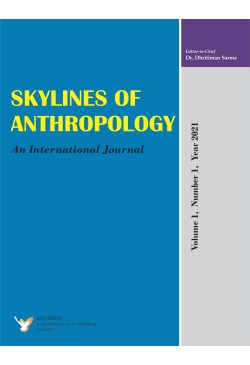SASkylines of Anthropology

Peer Reviewed Journal

Peer Reviewed Journal
Understanding Prophetic Voice of Amos 5 in Church Leadership in Nigeria
The prophetic voice of Amos in Chapter 5 offers a compelling critique of religious practices, social justice, and leadership, providing valuable insights for contemporary Nigerian church leadership. This chapter denounces ritualistic worship devoid of moral substance, calls for genuine social justice, and advocates for authentic repentance. For Nigerian churches, Amos 5 serves as both a challenge and an opportunity to realign their practices with principles of justice, righteousness, and ethical behavior. This paper explores the implications of Amos 5 for Nigerian church leadership, emphasizing the need for worship that integrates ethical living, the importance of advocating against systemic injustice and corruption, and the necessity for fostering genuine repentance. By addressing these areas, Nigerian church leaders can lead their congregations toward a more authentic and impactful expression of faith, reflecting the transformative power of Amos’s prophetic message.
Keywords: Prophet, Prophecy, Leadership, Prophetic Voice, Church Leadership
Theodora Amuche Clement & Favour C. Uroko 2024. Understanding Prophetic Voice of Amos 5 in Church Leadership in Nigeria. Skylines of Anthropology, 4: 2, pp. 77-93.
A Liminal Exploration of Traditional Tagin Marriage Rituals and Ceremonial Practices
This article examines the transitional aspects of traditional Tagin marriage rites and ceremonies, using Arnold van Gennep’s foundational work, Rites of Passage, as its conceptual framework. The study examines the pre- iminal, liminal, and post-liminal phases of the Tagin community's marriage practices, highlighting the transforming nature of these rituals. The study elucidates how these events facilitate people's transitions between social ranks and reinforce community bonds by applying ethnographic fieldwork and qualitative research. The results indicate that the three phases are crucial to the Tagin marriage process, serving as a conduit for individual and communal development. This inquiry advances the greater scholarly knowledge of liminality and underlines the cultural distinctiveness and complexity of Tagin's marital practices. Its views retain importance for academics exploring the intersection of ritual, identity, and social structure in tribal societies.
Keywords: Liminalities, Tagin, marriage rituals.
A Liminal Exploration of Traditional Tagin Marriage Rituals and Ceremonial Practices 2024. Understanding Prophetic Voice of Amos 5 in Church Leadership in Nigeria. Skylines of Anthropology, 4: 2, pp. 95-106.
Hindu and Brahmin
The two words Hindu and Brahmin have been in use since ancient times. While the word Brahmin may have originated in Vedic period, the word Hindu seems to have evolved at a much later time period. These two words have been used for a definite group of people, who could be distinctly identified from the other contemporary groups. Originally, the word Brahmin is understood to have been a more general one, and encompassed a large group of people. The word Hindu got into parlance for use in a similar fashion. Today the word Brahmin is supposed to be a subset of a larger group, termed as Hindu . It would be interesting to give a fresh look into the origin of these two words.
Keywords: Hindu, Brahmin, Sindhu, Seafarer, Brahma, Human interaction, Migration
R N Misra 2024. Hindu and Brahmin. Skylines of Anthropology, 4: 2, pp. 107-112.
Extinction of Indigenous knowledge of Gond, Kolam and Pradhan
This research paper is based on the conducted field work in the four tribal villages of the Gond, Kolam and Pradhan tribes of Maharashtra. In the present context, the various exogenous factors are posing threats on the sustainability of the local and regional, traditional, indigenous knowledge, arts and skills of the tribal communities. It is evident to note that indigenous knowledge is area specific; it is also true that, people residing in the different regional settings have evolved their own indigenous wisdom which helps in their mere survival and assures existence. However, due course of times, modernizations, human intervention, developmental projects and policies left impacts adverse on the tribal societies. Thus these various factors which are posing threats to the preservation of indigenous knowledge. In the entire process of development and change, it is important to note that the process of change entails various challenges and comprises issues which are contested. Tribes are considered to be the sensitive one who always suffers from various changes occurred in their lives whether it is natural calamities or human led developmental interventions. The case of Gond, Kolam and Pradhan tribes predominantly residing in studied tribal belt of Kinwat in Nanded district of Maharashtra, due to the various forces, tribal’s lives have undergone various changes. They still are practicing subsistence economic activities in extreme difficulties. The various modernization driven developmental interventions made so far in this region has not helped much the Gonds, Kolam and Pradhan tribes in terms of improving traditional survival strategies; in fact, it has adversely affected their indigenous knowledge and wisdom systems. Against this backdrop, this study discusses few case studies of tribal farmers belonging to above tribes and shows how their life has status of their indigenous knowledge which is on the edge of extinction in coming days.
Keywords: Indigenous Knowledge, Change, Modern developmental intervention, survival
Baburao Jadhav, G.S. Yelne, Pravin Khandagale & Ravi Gundewad 2024. Extinction of Indigenous Knowledge of Gond, Kolam and Pradhan. Skylines of Anthropology, 4: 2, pp. 113-130.